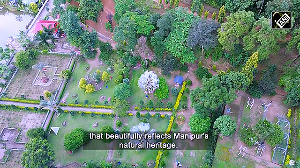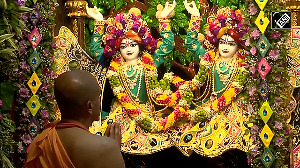The Richard Nixon administration in the US had initiated a "covert action plan" in collusion with General Yahya Khan's government in Pakistan in 1971 to encourage a separatist movement in Punjab, a former top officer of the Research and Analysis Wing has said.
"This plan envisaged the encouragement of a separatist movement among the Sikhs for an independent state to be called Khalistan. In 1971, one saw the beginning of a joint covert operation by the US intelligence community and Pakistan's Inter Services Intelligence to create difficulties for India in Punjab," B Raman, who retired as additional secretary in the Cabinet Secretariat, says in his forthcoming book.
In the book The Kaoboys of R&AW -- Down the Memory Lane that is yet to be published, he said the US interest in Punjab militancy "continued for a little more than a decade and tapered off after the assassination of Indira Gandhi" by two Sikh security guards on October 31, 1984.
Elaborating, Raman said Jagjit Singh Chauhan, a Sikh leader from Punjab, went to the UK and took over the leadership of the defunct Sikh Home Rule movement and renamed it after Khalistan.
The then Pakistani military ruler Yahya Khan invited Chauhan to Pakistan, "lionised" him as a leader of Sikhs and handed over some Sikh holy relics kept in Pakistan, which Chauhan took to the UK to win a following in the Sikh diaspora.
Chauhan also went to New York, met officials of the United Nations and some American journalists and alleged human rights violations of Sikhs in India.
"These meetings were discreetly organised by officials of the US National Security Council Secretariat then headed by (Henry) Kissinger," the former R&AW officer says.
"With American and Pakistani encouragement, the activities of Chauhan continued till 1977. After the defeat of Indira Gandhi in the elections in 1977 and the coming to power of a government headed by Morarji Desai, Chauhan abruptly called off his so-called Khalistan movement and returned to India," writes Raman.
Observing that foreign intelligence agencies were not helpful in providing information on Sikh extremist activities in their respective countries, he says the political leadership of western countries like the UK, the US and Canada, which has sizeable Sikh population, did not want to antagonise them by cooperating with the Indian government against the Khalistanis.
Giving an example of "non-cooperation", he refers to the authorities in the then West Germany.
He says Talwinder Singh Parmar of Babbar Khalsa, a sacked sawmill worker in Vancouver in Canada who was wanted in several cases in India like the Nirankari massacre and had been making "threatening" statements against Indira Gandhi, was arrested while travelling from Zurich to West Germany following an INTERPOL alert.
The German authorities not only did not hand him over to a CBI team, which had rushed to Bonn to take him into custody, but sent him back to Vancouver.
Two years later, Parmar played an active role in the conspiracy, which led to the blowing up of the Air India plane 'Kanishka' killing over 300 passengers, the retired R&AW official says adding, "the West German authorities cannot escape a major share of responsibility for this colossal tragedy."
On the storming of the Golden Temple in June 3-6, 1984, Raman writes that as Jarnail Singh Bhindranwale and his followers started gathering arms inside the complex and a spurt in terrorist incidents was witnessed across the country, there was "panic" in the government when trans-border sources of IB and R&AW reported that ISI was infiltrating Pakistani ex-servicemen and some serving Pakistani armymen into Punjab.
However, these IB and R&AW reports were later proved wrong, he says.
But the "alarm" led Indira Gandhi to frantically find a political solution and to use Akali Dal leaders to pursuade Bhindranwale to vacate the temple.
"Rajiv Gandhi and two of his associates held a number of secret meetings with Akali leaders in a New Delhi guest house of the R&AW. I was given the task of making arrangements for these meetings, recording the discussions, transcribing them and putting up the transcripts to (Rameshwar Nath) Kao for briefing Indira Gandhi," Raman said.
Kao was then the senior advisor to the prime minister.
Maintaining that the talks failed to persuade Akali leaders to see reason and cooperate with the government, he said, "The transcripts, which were kept in the top secret archives of the R&AW, were very valuable records of historic value.
"They showed how earnestly Indira Gandhi tried to avoid having to send the Army into the Golden Temple," he said.
Raman also elaborated on the pros and cons of the army raid, called Operation Blue Star, its impact on the sentiments of the armymen as well as the Sikhs.
The "lingering hurt" aggravated the Khalistani trouble and finally led to the killings of Indira Gandhi and then army chief Gen A S Vaidya.





